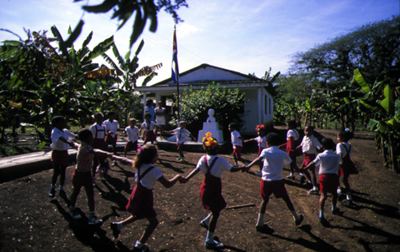Siksè kiltirèl Kiba nan il la alawonnbadè ak kanpay edikayonèl li previzib. Pèp kiben an, depi triyonf Revolisyon an, gen opòtinite ogmante konesans li epi devlope espètiz talan atistik li donk pakonsekan yo gen yon gran voulwa nan kontinye ogmante sou konesans yo gen deja. Sa ki enpresyonan, se tout patisipasyon ak enterè Kiben yo montre chak jou nan gade e suiv kou nan televizyon ki enkli: lang, literati e apresyasyon pou ar. Se nan rekonesans travay gouvènman kiben an ke l fasilite e ankouraje tout moun devlope yon amou e apresyasyon pou pwòp kilti yo e rekonèt tou enpòtans nan aprann lang etranje pou kapab kominike ak lòt nasyonalite. Yon tip kanpay konsa kapab antreprann nan peyi sosyalis paske tout resous nasyon an aladispozisyon pèp la. Pakonsekan, medya piblik la ak enstriksyon e anseyan yo kapab atire bezwen nasyon an pito ke bi komèsyal.
Konfòm a ideyoloji entènasyonalis Kiba, benefis devlopman yo nan tout domèn, la pou pataje ak lòt peyi k sou ray devlopman. Yon ekzanp resan, se patisipasyon Kiba nan travay alfabetizasyon k ap fèt Ayiti. Ayiti se premye peyi Amerik Latin ki pran endepandans li an 1804. Selon estatistik ofisyèl, Ayiti se peyi k pi pòv tou nan rejyon an ak yon to analfabetis 55% (pou san). Kiba fè esperyans lan nan pwòp kanpaydalfabetizasyon gouvènman revolisyonè a te òganize an 1961; yon kanpay, ki ak siksè, eradike analfabetis nan peyi yo. Espètiz sa a aladispozisyon kounyeya pou Repiblik Ayiti. Ane k sot pase a (2000), ofisyèl ki sot nan Ministè Edikasyon Kiba travay ak Ayisyen, bati chema ak devlopman kou alfabetizasyon nan lang kreyòl, bagay ki pral transmèt nan radyo atravè nèf depatman yo.
Kreyòl se premye e lang ofisyèl Ayiti; sèt milyon edmi pèp la pale l. Yon pwojè pilòt ak plizyè ankèt fèt deja pou evalye bezwen alfabetizyon pèp la. Monitè alfabetizasyon pral vizite pwovens yo pou evalye pwogrè patisipan yo epi gade fason metòd la apwopriye. Pandan Kiba ap devlope talan nasyonal pou benefis pèp la, li toujou sonje lòt peyi ki bezwen sipò ak ankourajman pou atenn dwa granmoun yo ak diyite atravè lakonesans, sante anfòm, ak idantite nasyonal.
[ Kredi sous (an liy): Max Blanchet. - Tèks orijinal reposte ak pèmisyon jeran lis «Haiti Mailing List», Bob Corbett, (haiti@list.webster.edu). Sijè #7212: «Cuba and Literacy in Haiti». © 2001 Radio Habana Cuba, NY Transfer News. All rights reserved.
Viewpoint: Cuba Continues Its Cultural and Educational Program
The success of Cuba's island-wide cultural and educational campaign is predictable. The Cuban people, since the triumph of the Revolution, have had the opportunity to increase their knowledge and develop their artistic expertise and therefore are keen to build on the knowledge they already have. What is impressive is the total involvement and interest shown by Cubans who daily watch and follow television courses including the English language, literature and art appreciation. It is to the credit of the Cuban government that it facilitates and encourages all of the people to develop a love and appreciation of their own culture and also to recognize the importance of acquiring foreign languages in order to communicate with other nationalities. This kind of campaign can be undertaken in a socialist country because all the resources of the nation are at the disposal of the people. Therefore the public media and the instruction and teachers can be directed towards the nation's needs rather than for commercial purposes.
In line with Cuba's internationalist ideology, the benefits of the developments in all areas are shared with other developing nations. A recent example is Cuba's involvement in the literacy work being done in the Republic of Haiti. Haiti was the first Latin American country to gain its independence in 1804. It is also, according to official figures, the poorest country in the region with an illiteracy rate of 55 percent. Cuba has the experience, because of its own literacy campaign organized by the new revolutionary government in l961, which successfully wiped out illiteracy in this country. This expertise has now been put at the disposal of the Republic of Haiti. Over the last year, officials from the Cuban ministry of education have been working with Haitians, designing and developing literacy courses in the Creole language which will be transmitted on radio to all nine provinces.
Creole is the first and official language of Haiti and is spoken by all seven and a half million inhabitants. A pilot project and several surveys have been conducted to assess the literacy needs of the Haitian people. Literacy monitors will visit the provinces and assess the participants progress and suitability of the methodology. While Cuba is developing its national talent for the benefit of the people, it always keeps in mind other countries that need support and encouragement to achieve sovereignty and dignity through knowledge, good health and national identity.]
Tradiksyon anglè - kreyòl ayisyen: E. W. Védrine
Emmanuel W. Védrine
E. W. VEDRINE CREOLE PROJECT, Inc.
P.O.B. 255962
Dorchester, MA 02125-5110 (U.S)
e_vedrine@hotmail.com
|

